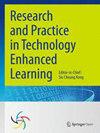基于脑电数据检测死锁的过程中反馈问题学习及其评价
IF 3
Q1 EDUCATION & EDUCATIONAL RESEARCH
Research and Practice in Technology Enhanced Learning
Pub Date : 2022-12-28
DOI:10.58459/rptel.2023.18028
引用次数: 1
摘要
学习活动的反馈是实现适应性学习最重要的问题之一。在这项研究中,我们提出了一种机制来解决这个问题,通过检测学习者在学习活动中的死锁状态,并提供反馈来消除这种状态。对学习活动产品的反馈(我们称之为“过程后反馈”)已经在许多交互式和适应性学习环境中实现。然而,活动期间的反馈(我们称之为“进程内反馈”)很少被实现。当学习者在学习过程中对学习材料感到困难或沮丧时,过程中反馈被认为比过程后反馈要好得多。实施过程中反馈的困难在于反馈的时间和内容。有人指出,必须尽早实现死锁的检测;否则,会降低学习者的学习动机。因此,我们将重点放在脑电图(EEG)数据上,因为它很难被欺骗,而且可以清楚地检测到学习者的状态。通过将脑电图数据与机器学习相结合,我们开发了一个模型,用于检测学习器何时卡住,从而使我们能够检测到时间。然后,我们根据学习者的知识结构和任务响应状态来估计学习者的知识状态,从而产生适当的反馈。我们在提出算术字问题的学习环境中实施并评估了过程中反馈方法。本文章由计算机程序翻译,如有差异,请以英文原文为准。
In-process feedback by detecting deadlock based on EEG data in exercise of learning by problem- posing and its evaluation
Feedback on learning activities is one of the most important issues in achieving adaptive learning. In this study, we propose a mechanism for solving this problem by detecting the deadlock state of a learner during a learning activity and providing feedback to eliminate such a state. Feedback on the products of learning activities (we call it “after-process feedback”) has been implemented in numerous interactive and adaptive learning environments. However, feedback during an activity (we call it “in-process feedback”) has rarely been implemented. In-process feedback is considered to be much better than after-process feedback when learners have difficulty or become frustrated with the learning material during the learning process. The difficulty in implementing in-process feedback lies in the timing and content of the feedback. It has been pointed out that the detection of a deadlock must be achieved as early as possible; otherwise, it reduces the learning motivation of the learner. Therefore, we focused on electroencephalograph (EEG) data, which are difficult to cheat and can clearly detect the state of the learner. By combining EEG data with machine learning, we developed a model for detecting when a learner is stuck, allowing us to detect the timing. After that, we generate the proper feedback by estimating the knowledge state of the learner based on the knowledge structure and task response status. We implemented and evaluated the in-process feedback approach in a learning environment posing arithmetic word problems.
求助全文
通过发布文献求助,成功后即可免费获取论文全文。
去求助
来源期刊

Research and Practice in Technology Enhanced Learning
Social Sciences-Education
CiteScore
7.10
自引率
3.10%
发文量
28
审稿时长
13 weeks
 求助内容:
求助内容: 应助结果提醒方式:
应助结果提醒方式:


